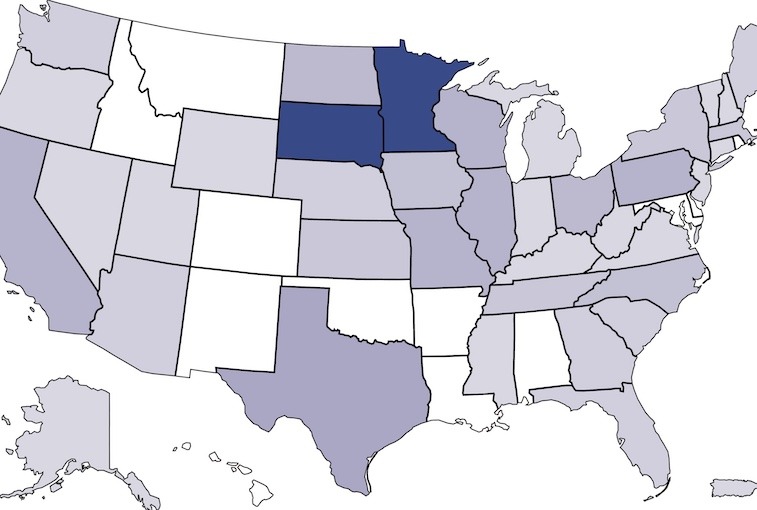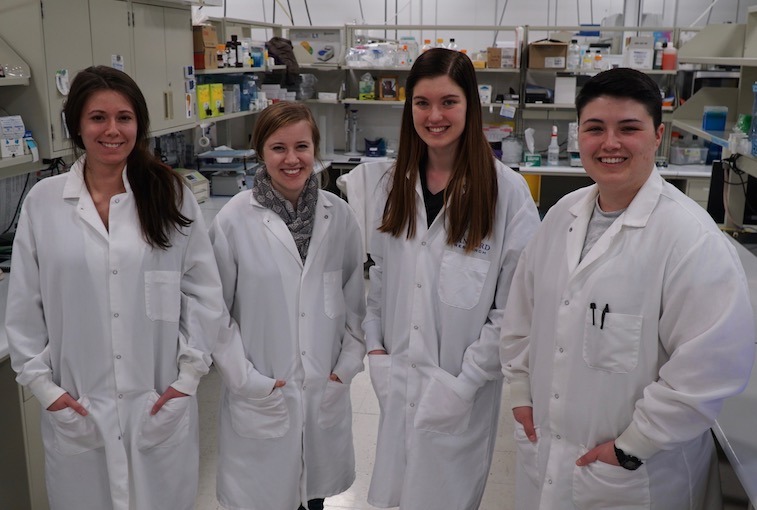Two new federal grants totaling $856,000 will fund undergraduate research internships in a Sanford Health program that already draws top students from around the world.
The funds from the National Institutes of Health and National Science Foundation will help ensure a new generation of young scientists can gain hands-on research and lab experience at Sanford Research in Sioux Falls, South Dakota, said Lance Lee, Ph.D., director of higher education at Sanford Research.
“Fostering successful undergraduate students can change their lives forever. By engaging them in an intensive summer program, we are laying a strong research foundation,” he said. “This year we have the great benefit of being awarded two prestigious federal grants for undergraduate summer researchers.”
Undergraduate experiences
The Research Experiences for Undergraduates (REU) in Cellular and Molecular Biology is a $329,000 grant by NSF. This award is a renewal of the previous NSF REU grant awarded to David Pearce, Ph.D., at Sanford Research in 2013-2016.
Sanford Research has extremely successful undergraduate programs — specifically, the Sanford Program for Undergraduate Research (SPUR). It was because of this success that Sanford Research was awarded the NSF-funded grant a second time.
With NSF funding, Sanford Research is able to train 10 undergraduate students each summer for the next three years (2019-2021) in a 10-week research program overseen by Drs. Pearce and Lee.
Pediatric biomedical research
Sanford Research was also awarded $526,732 through an R25 undergraduate grant. The grant is through the Eunice Kennedy Shriver National Institute of Child Health and Human Development, a subdivision of NIH.
This means for the next five years (2019-2023), Sanford Research has funding to train 10 undergraduate students each summer. Jill Weimer, Ph.D., and Dr. Lee will oversee that 10-week undergraduate research program.
Branching outside the Midwest
Both the REU and NIH grants aim to grow and attract people with a range of backgrounds to the scientific workforce. Special emphasis is placed on underrepresented students with limited exposure to research opportunities.
“The REU and NIH grants are the premier funding mechanisms available. They bring an enormous amount of exposure across the country. Academic advisers are telling students to look for these programs,” Dr. Lee said.
“For many years, Sanford Health has had students typically applying into the program from surrounding states in our region. With this grant funding, we should see our application numbers go way up. Not just from students in our own region but from across the country.”
Of the nearly 200 applications received for 2019, states with the most applicants include 46 from South Dakota, 34 from Minnesota and 12 from other countries and Puerto Rico. After that, top states include Texas, California, Illinois, Missouri, Pennsylvania, Wisconsin, North Dakota, Ohio, Iowa and North Carolina.
Enlarge

Bethany Freel of Sedalia, Missouri, interned at Sanford Research in 2016 and now trains full time in the lab as she pursues her doctorate degree in basic biomedical sciences from the University of South Dakota. She agreed the grants demonstrate the high level of research available in the internships.
“When Sanford Health gets national grants, whether NSF or NIH, it gets them exposure on the main websites, which gets national STEM (science, technology, engineering and math) exposure versus regional. It’s easy for STEM students at the undergraduate level to find our programs because we’re on a national map,” she said.
“We get some Ivy League kids, but most of the kids we get are from smaller institutions that don’t have access to research. Sanford Research wants to make sure that these kids get the experience needed to excel in graduate school and professional environments.”
The summer program
Sanford Research’s undergraduate programs prepare students for graduate school and a career in research. Each student receives a stipend and free housing. Daily transportation is available to and from Sanford Research.
The program begins with student project proposals. At its conclusion, each presents research results at a symposium.
“Each student has their own research project. They’re not just learning a technique. They’re applying it to a process or disease,” said Ellen Voigt, a 2014 SPUR intern from San Antonio who now works as a lab technician. She will begin her M.D./Ph.D. program this summer at the University of Iowa.
Dr. Lee said, “Dynamic summer programs allow students to gain a stepping stone toward experience in research. In addition, participants attend weekly career and professional development workshops. They build their presentation and communication skills.”
Over the course of the summer, students gain knowledge in scientific process, think critically and learn hands-on. It’s not just 40 hours in the lab. Students prepare for a career with Graduate Record Examination (GRE) prep course work, presentation, regular seminars and social activities.
“It really opened my eyes to research and what the research world was about. I came from rural South Dakota (Emery), and I didn’t know what the GRE or a Ph.D. program was,” said Rachel Laufmann, who interned with Dr. Weimer for three years. She also worked as a technician while finishing her undergraduate degree, and for another year before starting her doctorate at USD.
Laufmann views research as important in the practice of medicine because it ultimately benefits patients, like her work with Dr. Weimer on rare diseases. “To be able to do studies that give families hope for disease with no real treatment, that’s something that a nurse or doctor wouldn’t be able to do by themselves,” she said.
Open, collaborative space
The open, collaborative environment at Sanford Research is a great place for students to train. Students learn from a team of internationally recognized researchers, post-doctorate fellows, lab technicians, graduate students and undergraduate students.
“For a lot of us, it’s the first research experience we have in college. It’s how I got my foot in the door on research,” said Elle Anderson, who interned in 2012 and is now pursuing graduate studies in the lab. She grew up in Harrisburg, South Dakota, and is in her fourth year of the M.D./Ph.D. program at USD.
“Theres’ a lot we don’t know about how diseases work, and that can often hold the key to developing new treatment strategies. That’s what research is doing,” Anderson said. “I think you have to understand the disease to treat it well.”
Dr. Lee said that is Sanford Research’s goal: completing research to better treat patients. Because of that spectrum of research, undergraduate students can study the mechanism’s underlying disease, the health outcomes because of disease or both together.
“They interact with scientists at all levels and who are doing all areas of research, setting the program apart. Plus, they get to learn alongside other undergraduates in different labs,” he said.
Voigt echoed that.
“I think research is an investment. Most really great discoveries we’ve had that substantially impacted health care came from basic science, from people who are trying to understand the world and the problems that plague us,” she said.
The future of research
Applicants across the world now see that Sanford Research offers one of only two NSF REU programs in South Dakota. Similarly, the NIH has only two NIH-funded undergraduate R25 grants in South Dakota -– one of which is Sanford Research. And the research center is the only NICHD-funded R25 grant in South Dakota.
Other NSF grants at Sanford Research include an REU social-behavioral science grant. This grant is led by principal investigator DenYelle Kenyon, Ph.D., and focuses on Native American community-based research.
“Undergraduate students bring so much to research. It is mutually beneficial,” Dr. Lee said. “Our researchers get to mentor and find ways to explain complex areas of research simply. Graduate students learn how to train and collaborate with younger colleagues. And undergraduate students get to learn how to do cutting-edge research.”
More stories
- Research internship program attracts students nationwide
- Bush Fellowship goes to Sanford Health researcher
…
Posted In Health Information, Innovations, News, People & Culture, Research, Sanford Stories, Undergrad College Resources
